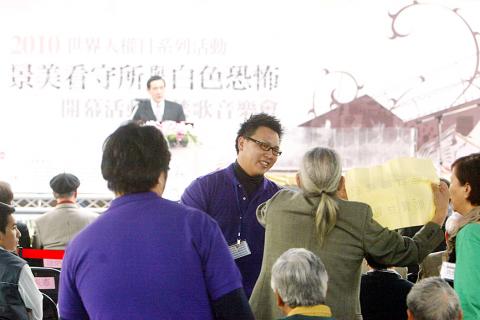Calling President Ma Ying-jeou (馬英九) a human rights violator who had no right to talk about human rights, dozens of former political prisoners yesterday protested as the president delivered a speech at the Jingmei Human Rights Cultural Park as part of events to mark International Human Rights Day.
“You’re a transgressor!” “Ma Ying-jeou, step down!” “You don’t deserve to stand there and talk!” “We don’t want to listen to your lies!” the protesters shouted.
One after another the former political prisoners, their families and friends stood up from the audience and shouted as Ma took the podium at the inauguration of an exhibition on the White Terror at the former detention center in Sindian City (新店), Taipei County.

PHOTO: CNA
The White Terror refers to the period from 1949 to 1987 when martial law was in effect, during which tens of thousands of political dissidents and others were arrested, jailed, disappeared, executed or murdered with or without trial.
Ma continued his speech even as many of the protesters staged a walkout, leaving about one-third of the seats empty.
“I can understand why some of our friends have different voices. I appreciate that they are willing to come and I’m willing to listen to what they have to say,” Ma said.
Speaking to media outside the venue, Huang Shu-chun (黃淑純) said she could not bear to listen to the president talk as if human rights abuses were a thing of the past.
“Human rights violations are happening today and even if Ma talks about human rights, it’s gotten worse since he came into office,” Huang said. “Take freedom of the press for example. As reporters, don’t you feel there are more restrictions and government interference now?”
Lin Shu-chih (林樹枝), a former prisoner of conscience, said someone who had “no idea” about human rights and was one of the perpetrators of human rights abuses during the White Terror did not deserve to talk about human rights on Human Rights Day.
Ma, who studied in the US in the 1970s on grants from the Chinese Nationalist Party (KMT), is alleged by many Taiwanese who were in the US at the same time to have been a “professional student” who spied on anti-government activities by other students.
Ma has repeatedly denied the allegation over the years.
The White Terror exhibition features books, sketches, pictures and personal items from political prisoners who were held at the Jingmei Military Detention Center. The exhibition will run until Dec. 10, 2012.

The Ministry of Foreign Affairs (MOFA) yesterday said it is closely monitoring developments in Venezuela, and would continue to cooperate with democratic allies and work together for regional and global security, stability, and prosperity. The remarks came after the US on Saturday launched a series of airstrikes in Venezuela and kidnapped Venezuelan President Nicolas Maduro, who was later flown to New York along with his wife. The pair face US charges related to drug trafficking and alleged cooperation with gangs designated as terrorist organizations. Maduro has denied the allegations. The ministry said that it is closely monitoring the political and economic situation

Conflict with Taiwan could leave China with “massive economic disruption, catastrophic military losses, significant social unrest, and devastating sanctions,” a US think tank said in a report released on Monday. The German Marshall Fund released a report titled If China Attacks Taiwan: The Consequences for China of “Minor Conflict” and “Major War” Scenarios. The report details the “massive” economic, military, social and international costs to China in the event of a minor conflict or major war with Taiwan, estimating that the Chinese People’s Liberation Army (PLA) could sustain losses of more than half of its active-duty ground forces, including 100,000 troops. Understanding Chinese

UNRELENTING: China attempted cyberattacks on Taiwan’s critical infrastructure 2.63 million times per day last year, up from 1.23 million in 2023, the NSB said China’s cyberarmy has long engaged in cyberattacks against Taiwan’s critical infrastructure, employing diverse and evolving tactics, the National Security Bureau (NSB) said yesterday, adding that cyberattacks on critical energy infrastructure last year increased 10-fold compared with the previous year. The NSB yesterday released a report titled Analysis on China’s Cyber Threats to Taiwan’s Critical Infrastructure in 2025, outlining the number of cyberattacks, major tactics and hacker groups. Taiwan’s national intelligence community identified a large number of cybersecurity incidents last year, the bureau said in a statement. China’s cyberarmy last year launched an average of 2.63 million intrusion attempts per day targeting Taiwan’s critical

‘SLICING METHOD’: In the event of a blockade, the China Coast Guard would intercept Taiwanese ships while its navy would seek to deter foreign intervention China’s military drills around Taiwan this week signaled potential strategies to cut the nation off from energy supplies and foreign military assistance, a US think tank report said. The Chinese People’s Liberation Army (PLA) conducted what it called “Justice Mission 2025” exercises from Monday to Tuesday in five maritime zones and airspace around Taiwan, calling them a warning to “Taiwanese independence” forces. In a report released on Wednesday, the Institute for the Study of War said the exercises effectively simulated blocking shipping routes to major port cities, including Kaohsiung, Keelung and Hualien. Taiwan would be highly vulnerable under such a blockade, because it